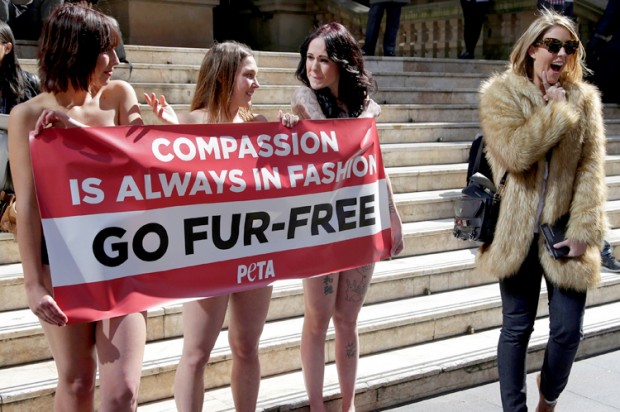Two researchers in Australia sought to test PETA’s hypothesis that sex sells animal rights:
Images of scantily clad women are used by advertisers to make products more attractive to men. This “sex sells” approach is increasingly employed to promote ethical causes, most prominently by the animal-rights organization PETA. Yet sexualized images can dehumanize women, leaving an unresolved paradox – is it effective to advertise an ethical cause using unethical means? In Study 1, a sample of Australian male undergraduates (N = 82) viewed PETA advertisements containing either sexualized or non-sexualized images of women. Intentions to support the ethical organization were reduced for those exposed to the sexualized advertising, and this was explained by their dehumanization of the sexualized women, and not by increased arousal. Study 2 used a mixed-gender community sample from the United States (N = 280), replicating this finding and extending it by showing that behaviors helpful to the ethical cause diminished after viewing the sexualized advertisements, which was again mediated by the dehumanization of the women depicted. Alternative explanations relating to the reduced credibility of the sexualized women and their objectification were not supported. When promoting ethical causes, organizations may benefit from using advertising strategies that do not dehumanize women.
The conclusion?
Overall, these findings are the first to demonstrate that sexualized images that dehumanize women reduce concern for ethical behavior in a domain unrelated to gender relations and sex.
Salon reports that PETA dug in their heels in response to the research, insisting naked women get the most media attention. So, perhaps we are misrepresenting PETA’s hypothesis. They’re using naked women not to raise awareness and stop animal exploitation, but to raise money and awareness about PETA. The “sex sells” tactic, I have argued, is indicative of the non-profit industrial complex, where compromised messages and fundraising are prioritized over actual social change. Really, PETA is ignoring this research even though it has been demonstrated that their tactics do not help Nonhuman Animals. They will continue objectifying women because it “grabs the headlines.” Can it be any clearer that this is not about social change effectiveness?
Of course, while this study demonstrates that there is no effectiveness, there is also a huge body of research that demonstrates that the sexual objectification of women is directly linked to violence against women and the devaluation of women.
This post originally appeared on the Academic Abolitionist Vegan.
 Dr. Wrenn is Lecturer of Sociology. She received her Ph.D. in Sociology with Colorado State University in 2016. She received her M.S. in Sociology in 2008 and her B.A. in Political Science in 2005, both from Virginia Tech. She was awarded Exemplary Diversity Scholar, 2016 by the University of Michigan’s National Center for Institutional Diversity. She served as council member with the American Sociological Association’s Animals & Society section (2013-2016) and was elected Chair in 2018. She serves as Book Review Editor to Society & Animals and has contributed to the Human-Animal Studies Images and Cinema blogs for the Animals and Society Institute. She has been published in several peer-reviewed academic journals including the Journal of Gender Studies, Feminist Media Studies, Disability & Society, Food, Culture & Society, and Society & Animals. In July 2013, she founded the Vegan Feminist Network, an academic-activist project engaging intersectional social justice praxis. She is the author of A Rational Approach to Animal Rights: Extensions in Abolitionist Theory (Palgrave MacMillan 2016).
Dr. Wrenn is Lecturer of Sociology. She received her Ph.D. in Sociology with Colorado State University in 2016. She received her M.S. in Sociology in 2008 and her B.A. in Political Science in 2005, both from Virginia Tech. She was awarded Exemplary Diversity Scholar, 2016 by the University of Michigan’s National Center for Institutional Diversity. She served as council member with the American Sociological Association’s Animals & Society section (2013-2016) and was elected Chair in 2018. She serves as Book Review Editor to Society & Animals and has contributed to the Human-Animal Studies Images and Cinema blogs for the Animals and Society Institute. She has been published in several peer-reviewed academic journals including the Journal of Gender Studies, Feminist Media Studies, Disability & Society, Food, Culture & Society, and Society & Animals. In July 2013, she founded the Vegan Feminist Network, an academic-activist project engaging intersectional social justice praxis. She is the author of A Rational Approach to Animal Rights: Extensions in Abolitionist Theory (Palgrave MacMillan 2016).
Receive research updates straight to your inbox by subscribing to my newsletter.

